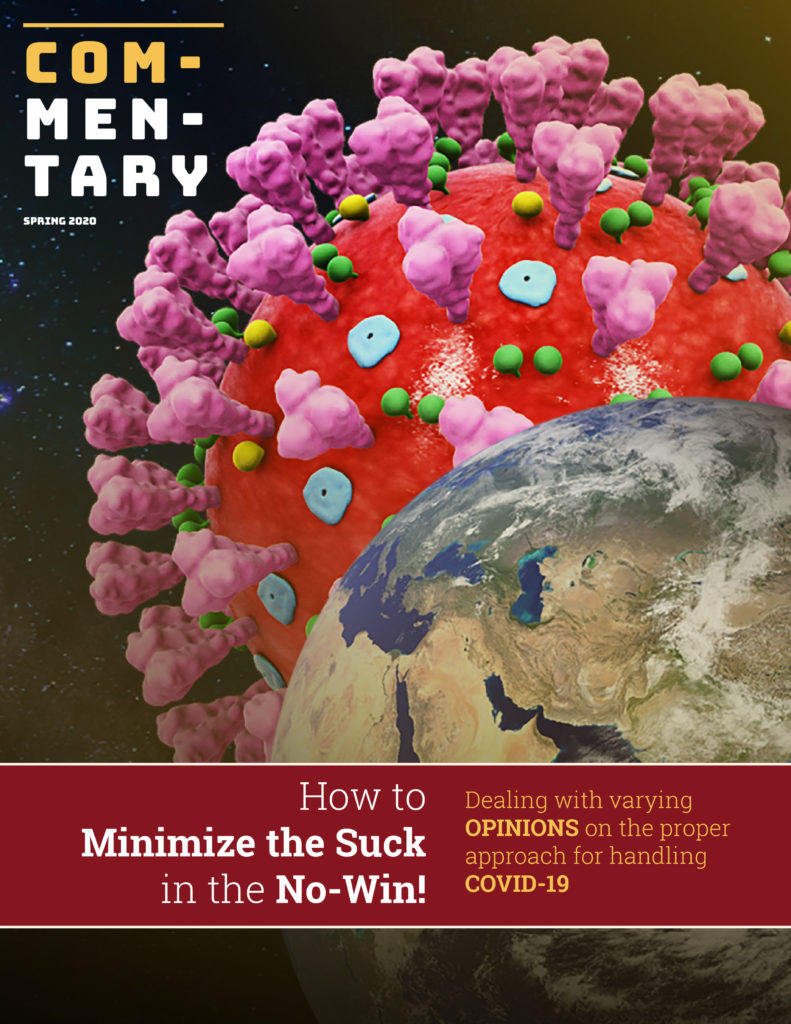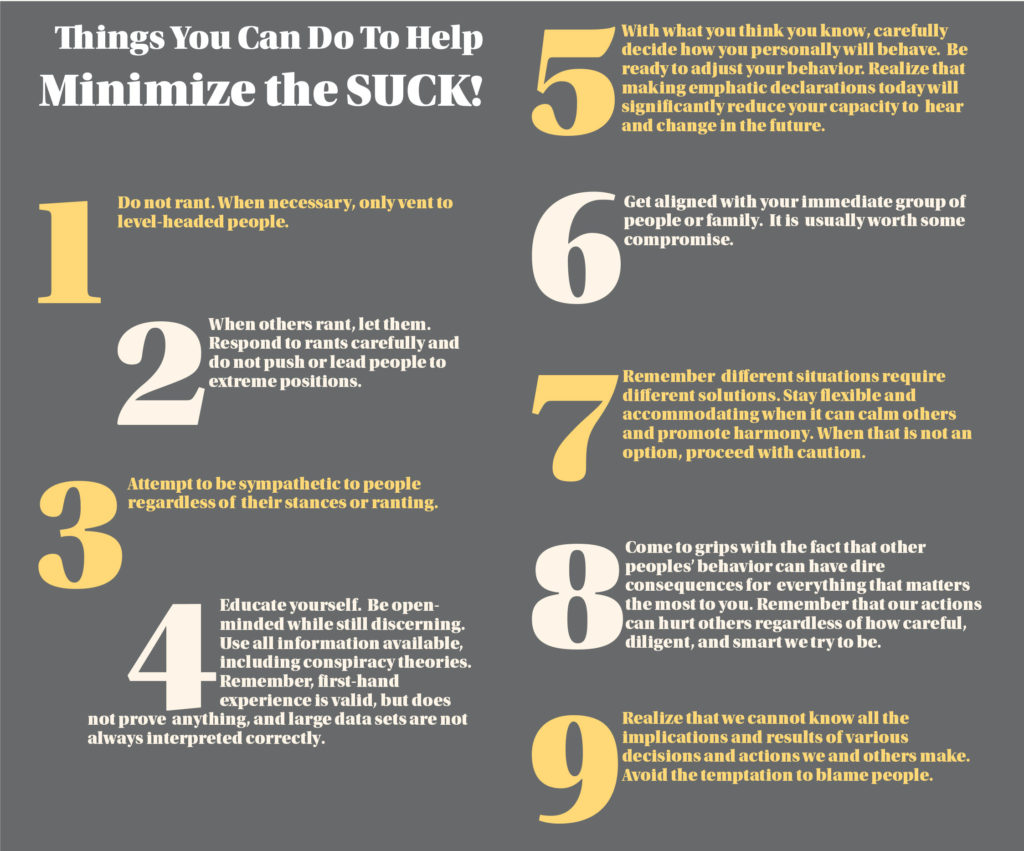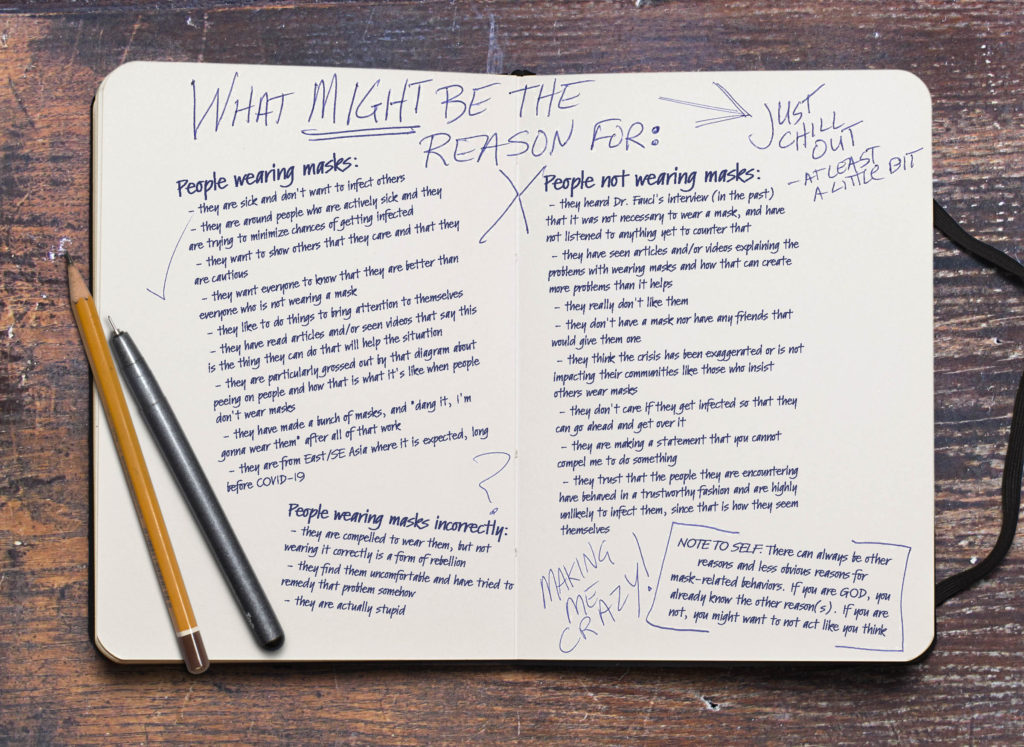How to Minimize the Suck in the No-Win!
Dealing with varying OPINIONS on the proper approach for handling COVID-19
Click here to access the Magazine Format- PDF file
A few unpleasant things have intensified in our lives, particularly in regards to COVID-19 and an appropriate response. Uncertainty? Check. Politics? Check. Self-righteousness? Check. Fear? Check. Some start with uncertainty, move through opinion that impacts 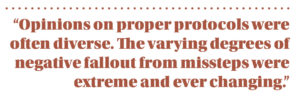 action, and end up with a bastardized type of certainty. It’s a weird continuum. It’s not the only path, but some have unconsciously ended up on this trajectory. In my opinion, that sucks. If you are offended by that word, please accept my apology. And yet, that really kind of feels like the correct word.
action, and end up with a bastardized type of certainty. It’s a weird continuum. It’s not the only path, but some have unconsciously ended up on this trajectory. In my opinion, that sucks. If you are offended by that word, please accept my apology. And yet, that really kind of feels like the correct word.
To better cope with this “no-win” COVID-19 situation, here are some suggestions based on personal experience that now seem relevant and analogous.
In case you would like to go straight to the conclusions, here are some suggestions that will minimize the bad, sad, and intensely annoying situation in which we humans have found ourselves when it comes to COVID-19.
Things You Can Do To Help Minimize the SUCK!
- Do not rant. When necessary, only vent to level-headed people.
- When others rant, let them. Respond to rants carefully and do not push or lead people to extreme positions.
- Attempt to be sympathetic to people regardless of their stances or ranting.
- Educate yourself. Be open-minded while still discerning. Use all information available, including conspiracy theories. Remember, first-hand experience is valid, but does not prove anything, and large data sets are not always interpreted correctly.
- With what you think you know, carefully decide how you personally will behave. Be ready to adjust your behavior. Realize that making emphatic declarations today will significantly reduce your capacity to hear and change in the future.
- Get aligned with your immediate group of people or family. It is usually worth some compromise.
- Remember different situations require different solutions. Stay flexible and accommodating when it can calm others and promote harmony. When that is not an option, proceed with caution.
- Come to grips with the fact that other peoples’ behavior can have dire consequences for everything that matters the most to you. Remember that our actions can hurt others regardless of how careful, diligent, and smart we try to be.
- Realize that we cannot know all the implications and results of various decisions and actions we and others make. Avoid the temptation to blame people.
None of the nine suggestions offered will “fix” the problem. We only can minimize the chance that actions we take will make a bad situation worse. Even with that as a goal, don’t be surprised when you get yelled at by someone who has decided they know how everyone should behave… and you’re not doing that!
This list was informed by personal experience living through a different “no-win” situation two decades ago. The only “win” possible in such circumstances is to know that you tried your best to navigate a truly difficult situation. Hopefully, some day in the future you will be able to know that you minimized the damage done by you through miscalculations, mistakes, or short-sightedness. At this point, I am still at peace believing that I have navigated things reasonably well while still being aware that I will never know all of the ways I helped or hurt others along the way. Here’s the story from the past that rings true with COVID-19.
In 1997, I left a major tech company to develop and implement the first client-server virtual private network for Christian missionaries and humanitarian workers working in some of the most dangerous places on the planet (war and disaster zones, areas with hostile government and/or religious authorities, terrorism, etc). The concerns for security and safety were very real. The technology and other non-technical approaches to living in such situations were either new or very unclear. Those I worked with were highly dedicated, serious, and intelligent people who had intentionally invested their lives and passion toward groups of “others.” This was even when they might be killed. In the process of trying to live out their individual callings, they were putting in harm’s way themselves, their friends, their supporters, their families, and even those they were hoping to show love and care. It was not just a perception; the stakes were very high.
The virtual private network (VPN) that we put into place was literally a God-send. For the next six years, I had a front row seat in watching how people navigated the dicey subject of “security.” I use quotes because there was much more going on than just that one word. Opinions on proper protocols were often diverse. The varying degrees of negative fallout from missteps were extreme and ever changing. Many of the people who were clueless were also constantly rotating in and out of the work before learning the ramifications of their actions. Also, depending on the geopolitical and local politics of power, the specific situations per location were also changing constantly. Everything was moving, and most people involved in this unwieldy equation were either volunteers or hard-headed field-workers who did not behave like “good little employees” afraid of being “fired.”
Additionally, there is no way to “prove” whether or not mitigating actions were worth taking. There were only stories to document when something went wrong. Even more disheartening, it was not always clear that better security protocols would have stopped whatever bad thing occurred. This dynamic often led to more cautious people being labeled as paranoid. Some were very paranoid. However, one must ask… “Is it paranoid if they really ARE out to get you?!”
There is no way around this situation being a complete mess. Opinions of what to do and how to behave were wildly different. Just by listening carefully to what people were actually doing, it was obvious that interpretations of written guidelines seemed to differ. As someone responsible for helping people with their security, I found it difficult to watch as people misunderstood, defied direction, or just simply made mistakes. In the case of missionary-related work, a person’s mistake could cost the life of a local believer; it might be someone not associated with their own work, but tied to a totally different team member. The lack of an actual high death count did not diminish the realization that the stakes were, in fact, that high. Beyond the possibility of murder, imagine the emotional complexities of spending 20 years of your life learning local customs and language, developing deep relationships with the local population, only to have a residence visa denied by the local government because someone was careless with email. For those unfamiliar with such work, legal access to a country or region is essential to most work. Therefore, losing one’s visa was a massive blow to someone’s entire work.
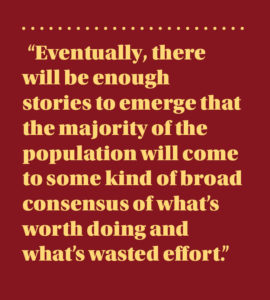 If it is not already obvious, my experiences in the mid-1990s and early 2000s were full of intensity, effort, and unclear outcomes. How best to direct, inform, train, and support people navigating “security” in their part of the world was difficult. Throughout it all, it became even more clear to me that humanitarian workers and missionaries are just people, even though they tend to be more action-oriented and impassioned than others. But they were not immune to the human condition. When implementing security protocols, some behaved poorly. Some were dismissive. Some were paranoid. Some didn’t try as hard as they could have. Many were not as impacted by security challenges as others and just didn’t think about it much. All of them made mistakes. At some point, many had to pay a price for their own failures or the carelessness of others. In early February 2020, the conversations starting to emerge around COVID-19 felt familiar to me. Then, shifts in attitudes and corresponding behaviors throughout March 2020 were no less painful, even as I recognized the same dynamics that I had seen play out 20 years ago.
If it is not already obvious, my experiences in the mid-1990s and early 2000s were full of intensity, effort, and unclear outcomes. How best to direct, inform, train, and support people navigating “security” in their part of the world was difficult. Throughout it all, it became even more clear to me that humanitarian workers and missionaries are just people, even though they tend to be more action-oriented and impassioned than others. But they were not immune to the human condition. When implementing security protocols, some behaved poorly. Some were dismissive. Some were paranoid. Some didn’t try as hard as they could have. Many were not as impacted by security challenges as others and just didn’t think about it much. All of them made mistakes. At some point, many had to pay a price for their own failures or the carelessness of others. In early February 2020, the conversations starting to emerge around COVID-19 felt familiar to me. Then, shifts in attitudes and corresponding behaviors throughout March 2020 were no less painful, even as I recognized the same dynamics that I had seen play out 20 years ago.
Today, two decades later, security related tools and protocols have matured in many regards. Many of the early mistakes have been addressed, obvious technical holes have been “plugged,” and more of the on-line public is generally aware of things that were completely new pre-2000. This is not to say that the security-related complexities have disappeared; they are all still there. Time and pain eventually led to a maturity that has lessened the uncertainties that intensified emotions back in the day.
In the same way, over time, COVID-19 (and whatever comes next) will become less unknown. Will that feeling of awareness be backed by real data, appropriate protocols, and wisdom? Most likely not – at least not en masse. And yet, the raw emotion and truly aggressive encounters between opposing opinions will fade somewhat. Eventually, there will be enough stories to emerge that the majority of the population will come to some kind of broad consensus of what’s worth doing and what is wasted effort.
COVID-19 complexities will likely remain. How we react individually and as regions and countries will change. Hopefully, they will be positive changes. Twenty years later, security problems some Christian missionaries face are still very real. Plus, people still do stupid things. Mistakes are made. It is truly sad when you hear of a death that is probably because someone didn’t follow the best protocols. And yet, the entire topic of security has been normalized. It no longer feels as out of control as it did back when the Internet was new and security tools had not yet been developed or understood.
Today, everyone has to work through this on their own while others do the same. When your spouse dies from COVID-19, this topic will take on a whole new level of intensity. On the other extreme, a rancher with no neighbors for 75 miles will have a different feeling. They would be sad to hear that some stranger far away lost their life-partner, but it’s still not as personal. The vast majority of humanity is somewhere between those two extremes.
This current scenario is a true “no-win” situation. What we do matters, but even that will not fix it. The best thing a person can do, based on my experiences from over 20 years ago, is to take COVID-19 seriously and try not to let our actions, attitudes, and opinions harm others as we all navigate this. A humble person will not scream at someone not wearing a mask. Politely asking someone if they would put one on is an option, but maybe just steering clear of them is the best option. The last thing you want to do is berate someone. Berating others today might give them reason for poor choices tomorrow.
Ultimately, each of us must come to grips with the fact that someone may do something really stupid that costs someone dearly. That someone could easily be you. Much like how a drunk or stoned driver can wreck multiple lives, people can do things that hurt others. Now this horrible truth has a new way and a new name. “No-win” situations can be made worse in both attitude and deed. Before anyone reads into this article that I have a problem with taking strong stances on what should be done, please carefully revisit the 9-point list provided. At no point is any part of that list indicating that you should not care deeply and try your hardest to do what is right. There is no solution to this. I challenge anyone to suggest that there is a call for lack of conviction. But that is not the same as when people don’t realize that they’re basically saying “It would all be better if everyone just did what I say is best!” Yeah. That’s not ever going to be true.
For a quick side-note, it is true the point of these suggestions is that things might be better if we did these things. However, the attitude of “just do it my way, and everything’s better” is not in me. This is not a projection of will on others. They are very different things.
Let’s circle back to the initial uncertainty, politics, and self-righteousness continuum. I propose that uncertainty will always wax and wane – in both reality and feeling. Politics get a bad wrap for good reason, since there seems to be way too many politicians involved with selfish goals. Even so, we must try the best we can to work through how to live together and how best to pay for whatever we decide.
When it comes to self-righteousness, I find it particularly common and distasteful. Not only do I personally have to fight against it, I find that the most self-righteous individuals rarely seem to see it in themselves. Plus, situations like COVID-19 and politics tend to inflame those prone to self-righteousness. If we are in a true “no-win” situation, there is no way to justify actual self-righteousness because you can’t be that kind of right. Declarations of “I know what’s best” are hollow in the face of “no-win” scenarios.
Having strong opinions and rigorously fighting for those opinions and subsequent action items are not mutually exclusive with humility and care. As we determine what we think about COVID-19, we decide to either keep silent or share those thoughts. Some will agree. Others will disagree. Their motives can be all over the place, and personally assessing whether or not those are good and worthy is each of our own right. Regardless, declaring those who disagree with you as morally deficient or “Neanderthal” is pretty much a sure sign someone is being self-righteous. That person is adding to our problems, even if their actual stances have merit.
We can strive to learn and minimize uncertainty, even though it will never go away. Politics are messy and necessary, so let’s just get on with it, and let’s see where it goes. We know that the results will continue to be less than optimal. And when it comes to our attitudes, humility and true compassion are the antidote to what is ailing us, in addition to the actual virus. Time will provide more perspective. It is a worthy goal to navigate “no-win” situations the best we can. “No-win” situations are part of life. We all need to get better at handling them, and teach the next generations what we can for the future.
Click here to access the Magazine Format- PDF file
A CASE STUDY
There are a number of very difficult scenarios in front of us when it comes to COVID-19 response, both locally and globally. We say it repeatedly, “There are no good answers.”
Personal Protective Equipment (PPE) is something that professional medical personnel know how to use properly. It’s kind of their thing. But the entire planet has been on a crash course attempting to learn how and when to use it. That has led to some real challenges and difficult situations.
The primary issue aggravating our collective learning curve has been the mixed messages that have come from “the officials” and other professionals. We shouldn’t be surprised that there can be differing opinions. But it’s complicated. Or maybe, better said, it depends. And that’s almost always true because it actually does depend; it depends on the situations and what you are hoping to accomplish.
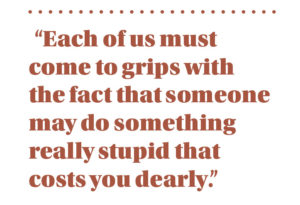 The attitudes outlined in the 9-point list entitled “Things I Can Do To Minimize The Suck” need to be applied in the use of protective masks. Some situational and some very intentional for non-health related reasons have added to the confusion. In other words, it is clear that some directions offered are for political reasons. Agendas abound.
The attitudes outlined in the 9-point list entitled “Things I Can Do To Minimize The Suck” need to be applied in the use of protective masks. Some situational and some very intentional for non-health related reasons have added to the confusion. In other words, it is clear that some directions offered are for political reasons. Agendas abound.
So, who can you trust? Well, that is the trick. That is the reason you need to take the question seriously. For those who might even question how serious COVID-19 is in the world of infectious diseases, even they must take this entire situation seriously as our collective response to COVID-19 is obviously of great import – socially and economically.
What we do matters. We can be part of the solution or we can be part of the problem. For most people, we’ll have to come to grips with the likelihood that we’ll both help and hurt – especially in our uncertainty. But we will most likely make things much worse if we don’t take all of this seriously.
With all of the seriousness and uncertainty, we benefit as we “lighten up” as often we can. Maybe realize that humor is valuable, even when it accompanies death. It’s not funny. But if you can manage it, try to acknowledge or “laugh” at the insane impossibilities we are facing. That is evidence that you are seeing the reality of our current situation. Then we can also possibly offer more grace to others.
God help us all!
GETTING SPECIFIC
Each person is unique in how we live regarding intention and reaction. Some people 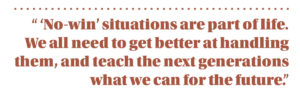 lean towards intentionality; others may skew towards pure reaction. As a wild guess, it’s possible that many of us are a strange mixture of both. In other words, we may be super intentional about some things and completely reactive on others. Some level of self-awareness about how we are would help before reviewing the following examples.
lean towards intentionality; others may skew towards pure reaction. As a wild guess, it’s possible that many of us are a strange mixture of both. In other words, we may be super intentional about some things and completely reactive on others. Some level of self-awareness about how we are would help before reviewing the following examples.
The list of “Things You Can Do To Help Minimize the SUCK!“ will need to be converted into specific and personal actions. Examples often help us learn when we are considering new ideas. As you check out a handful of example action items, don’t think of them as perfect for you. Think of them as something that might trigger in you a specific thing or two you can do that will make things better. Be intentional. Prepare to work at it.
EXAMPLE ACTION ITEMS
- Consider whether or not you are prone to ranting. If YES, create reminders for yourself to monitor how often you start rants or are tempted to rant. Consider having a close friend monitor you and provide encouragement to rant less.
- Start watching and listening carefully to whether or not people around you tend to rant. Try to encourage them without encouraging the actual ranting. Proactively offer to find out more information about whatever topic or issue led to their rant.
- Start observing rants with empathy or sympathy as you focus on their feelings about the rant’s topic. Also, pay close attention to what is behind the rant. This requires much more effort and will lead to truly engaged listening. Don’t be surprised how hard this exercise may be.
- Make notes regarding the different news sources you have decided to use on an on-going basis. Document your assessment of how diverse or agenda-driven a source might be as opposed to other sources. Make lists of issues that may flood your mind when dealing with complicated and interrelated issues like COVID-19. Make it your goal to organize your own thoughts.
- Attempt to determine a “policy statement” as to how you plan to behave given different circumstances. (You don’t need to share this with others. It’s a personal exercise.) Think through different likely scenarios you will encounter and consider how you might behave differently under various circumstances. Actively consider what information or changes could lead you to modify your own “policy.” In other words, answer “Are you willing to adjust?” If you have painted yourself into an ideological corner, what can you do to get out of it?
- Tell your family or coworkers that you would like to get aligned, if at all possible, and start discussing how to get to that point. The stated goal should be to make things less frustrating and confusing for everyone.
- Ask people why they are choosing to do what they are doing with the initial assumption that they might have insights you do not have. State to others that you are willing to change your current opinions when presented with better information.
- Actively think through the ways in which we cannot control other people’s behaviors and how we are impacted. This fact of life must be internalized. We cannot afford to let this “desire to control others” sneak up on us.
- Think through this fact: Situations arise in life that are not of anyone’s choosing. Actively consider what it would feel like if your decisions today were misguided and someone else was needlessly hurt. Realize that is a possibility and that it is true of everyone – regardless of stated intentions. Use this to offer grace more than blame.
CONCLUSION?
The COVID-19 response plans continue to develop on personal, local, national, and global levels – simultaneously. There is no consensus. It is likely that there never will be consensus on how best to handle the situation. The problems that are tied to COVID-19 and future viruses will not miraculously disappear either. We face both the deadly virus and our reaction to it. There is no one good solution or “fix.”
It is impossible to be certain that any one approach will be appropriate. Even when effective responses are implemented, it is human nature to apply “fixes” to related-but-different scenarios. Sometimes that works. Sometimes it does not. Unfortunately, when it doesn’t, that often provides “proof” to some people that the prescribed “fix” doesn’t work at all. That’s not good logic, but it is all too common. And it doesn’t take long to get confusing.
The best we can do is not add fuel to a damaging fire and make things worse than they already are. Whether or not one decides to intentionally work through the examples listed above, the goal is to intentionally decide good things. We don’t want to let our emotions and reactions to others (and their responses to COVID-19) make things worse.
The temptation is to just repeat this twenty times. Don’t make things worse by treating others poorly in the midst of such uncertainty. “We’re all in this together” is over-used. And yet, as humans, that has always been true. While that phrase might still be useful to some, I propose that managing ourselves can start with the 9-points (above) as they are solid and tangible ways to minimize a truly “sucky” situation.
COVID-19 sucks. Please don’t join it.
Written by J. Matt Wallace, April 2020
Published on JMattWallace.com
Copyright Mustang International 2020
Click here to access the Magazine Format- PDF file
